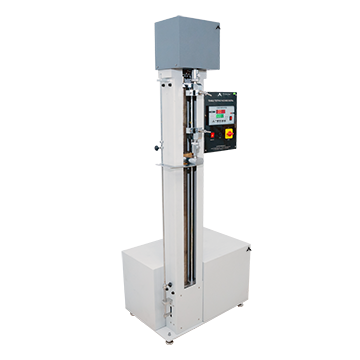Tensile testing machines are frequently employed in the packaging industry to assess the mechanical properties of packaging materials. These instruments exert a tensile force onto a sample of the material, subsequently revealing its strength, elasticity and durability. Tensile testing machines are utilized to evaluate different types of packaging materials, such as films, foils, paper and corrugated cardboard. The results obtained can be utilized to refine packaging design, ensure industry compliance and enhance product performance and safety.
The application of Tensile testing machines isn’t just confined to the packaging industry and can be observed across a diverse range of sectors like plastics, flexible films, automotive and rubber.
How does it work?
In a tensile test, sample material is attached at either end and pulled until it snaps. The machine documents the force needed to break it and the deformation of the material during the test. This information is used to analyse its mechanical properties and decide whether it is suitable for its intended use.
Benefits of Tensile testing machines
Tensile testing machines provide numerous advantages to the packaging industry, including:
- Tensile testing machines measure a material’s tensile strength, yield strength and other mechanical properties with accuracy and repeatability. This process is essential for quality control within the packaging industry, as it guarantees that all materials adhere to required standards.
- Through evaluation of different materials and designs, packaging designers can optimize their products to have the desired properties such as strength and durability.
- Tensile testing can assist in identifying weak spots or cost-saving areas in the design. Finally, this process is necessary for compliance with industry standards and regulations.
Applications of Tensile Strength Tester
Tensile strength testers – also referred to as universal testing machines or tensile testers – are employed to evaluate the mechanical properties of materials like ceramics, metals, plastics, textiles and composites. A few of the frequently used applications for these devices include:
- Tensile strength testers are commonly employed in industrial settings to guarantee the quality and evenness of raw materials, components, and final products. These tests permit manufacturers to detect any imperfections, discrepancies, or inconsistencies in the manufacturing process and implement the necessary corrections.
- Within the packaging industry, tensile strength testers are employed to evaluate the sturdiness and longevity of packaging materials, like cardboard, plastic films and foils, guaranteeing that they can tolerate the pressures which accompany shipment and manipulation.
- In the automotive industry, tensile strength testers are utilized to assess the robustness and resilience of automotive components, such as engine parts, suspension systems, and safety belts. This is to guarantee that these elements can endure the pressures that come with usage.
- The textile sector relies on tensile strength testers to evaluate the robustness and durability of yarns, threads, and fabrics that are employed in garments and other textiles.
- Structural engineering requires that materials, such as steel and concrete, are tested for tensile strength to guarantee they can handle the pressures and forces expected of them.
- Medical devices must be able to handle the stressors they are likely to experience during their intended use. Tensile strength testers are used to determine the strength and durability of these items, like sutures and catheters, so they can meet the criteria necessary for optimal performance.
Tensile strength testers are utilized for investigating and optimizing the mechanical traits and performance of various materials, including alloys, polymers, and composites, in different environments.
Why Choose Testronix Tensile Strength Tester Twin Column Machine
The Tensile Strength Tester twin column machine by Testronix is an accurate device for measuring breaking load capacity and elongation of stretchable specimens. It is the go-to instrument for destructive sample testing, allowing the user to calculate tensile force placed on their sample.
This is done by placing the specimen between clamps/grips and then separating them with a switch, which then leads to destruction due to the force applied. This destructive power can be seen in kgf units on the machine’s digital gauge.
Moreover, a fully equipped computerized software program comes along with the panorama model, creating test reports of Force Vs time that can be saved and emailed with pass/fail results and used to track sample trends.
The Tensile Strength instrument by Testronix features a twin-column rugged structure as well as an accurate grip separation operation. Additionally, it has the capability to store and display the peak value at which destruction occurred on its LED display. Users are guaranteed with highly precise test results, as the instrument follows ASTM D412 and ASTM D429-73 standards.

